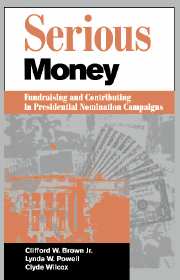Book contents
- Frontmatter
- Contents
- List of figures and tables
- Acknowledgments
- 1 Introduction
- 2 The regulatory environment
- 3 The contributor pool
- 4 Mobilizing the pool: Methods of soliciting campaign funds
- 5 Candidate resources
- 6 Recruiting contributors and solicitors: Candidate and individual decisions
- 7 Conclusion
- Appendix I The 1988 and 1992 presidential nomination surveys
- Appendix II 1988 and 1992 survey items used in the analysis
- Notes
- Bibliography
- Index
3 - The contributor pool
Published online by Cambridge University Press: 27 August 2009
- Frontmatter
- Contents
- List of figures and tables
- Acknowledgments
- 1 Introduction
- 2 The regulatory environment
- 3 The contributor pool
- 4 Mobilizing the pool: Methods of soliciting campaign funds
- 5 Candidate resources
- 6 Recruiting contributors and solicitors: Candidate and individual decisions
- 7 Conclusion
- Appendix I The 1988 and 1992 presidential nomination surveys
- Appendix II 1988 and 1992 survey items used in the analysis
- Notes
- Bibliography
- Index
Summary
Most donors of serious money to presidential nomination candidates come from an established pool of habitual givers, not from a body of mostly first-time contributors assembled on an ad hoc basis by different candidates each election cycle. As we saw in the preceding chapter, the size of the pool has generally grown election by election since the inception of the FECA rules. Yet even though there is defection from and especially recruitment to this pool, at any point in time the great majority of those who give serious money have contributed before and will do so again, though not necessarily in every election. In 1988, for example, 83% reported that they had contributed previously to a presidential candidate; 95% said they had previously made a political contribution of some kind.
This should not be surprising, since those who are motivated to contribute in one election will probably be motivated to do so the next time. All potential contributors must weigh the opportunity costs of making a cash contribution against an array of political, social, or material benefits that such a contribution might produce. Those who decided in the past that the benefits of contributing outweighed the costs are more likely to make a similar decision in the future than those who decided not to contribute in the past, or those who simply never considered doing so. Thus those who have a propensity to contribute in one election will probably have a propensity to do so next time.
Furthermore, such people are given every opportunity to act on their propensities and remain in the pool.
- Type
- Chapter
- Information
- Serious MoneyFundraising and Contributing in Presidential Nomination Campaigns, pp. 30 - 49Publisher: Cambridge University PressPrint publication year: 1995



